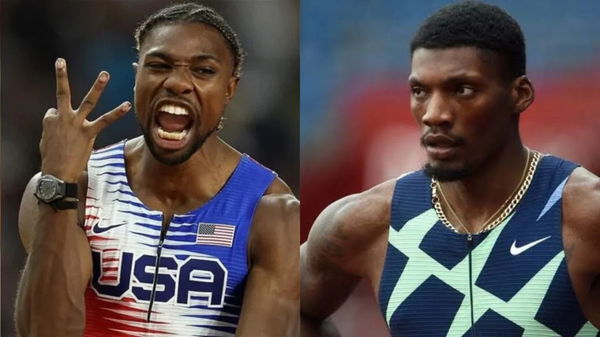
via Imago
Image credits : Imago

via Imago
Image credits : Imago
What if having an internationally recognized name for your nation didn’t translate into stable finances? Something similar is the thoughts of US track icons today. With just 47 days remaining before the Olympics in Paris, American track competitors are venting their displeasure. Fred Kerley and Noah Lyles are two among them who have openly discussed the difficult circumstances they encounter. The sportsmen have brought attention to the general issues and financial hardships that obstruct their success.
Lyles, well-known for his skill in the 200-meter race, has frequently talked about his mixed feelings about representing the US. He still has to overcome the social obstacles that come with being Black in America alongside the difficulties he encounters as a professional athlete. Similar thoughts were recently expressed by Kerley, a prominent track runner, who stressed the financial challenges associated with becoming an American athlete.
Fred Kerley did not hold back when speaking candidly about the financial inequalities that American track and field competitors must contend with. In a recent “Track World News” interview, Fred Kerley voiced his dissatisfaction. The 29-year-old stated, “I feel like if I were from a different country, I’d be living like a king.” He highlighted the stark differences between American athletes and those from other countries. Moreover, he compared the struggle to live and work in the US, saying, “Living in America and you know how the world in America working on a lot of us struggling day into a day out but if I would definitely live in another country, I’ll be living like a king.”
ADVERTISEMENT
Article continues below this ad
Kerley went on to describe the daily hardships faced by American athletes. Even with the results and best efforts, many still struggle to make ends meet. He observed that American athletes are frequently left on their own in contrast to athletes in other nations. “A lot of countries take care of their athletes; our government doesn’t take care of our athletes,” he stated.
Being able to train efficiently and concentrate on sports may be hampered by this lack of support. Kerley also talked about the adjustments he would want to see made to the way American athletes are paid. He underlined how important it is for the American government to help its athletes. “Just once we get to the top, make sure our country takes care of us,” he said. This appeal for action is a reflection of a larger need for structural modifications so that athletes thrive on and off the field.
A lack of funding for American athletes is an urgent problem that has to be addressed promptly. Kerley’s frank comments show how urgent this issue is. In response to a question on why he thought the government should help athletes, he said quite plainly, “Cuz it’s f*cked.” His direct reply demonstrates how frustrated he is with the current setup and how important improvements are.
The struggles faced by track icons like Noah Lyles and others
There are many in the track and field community who share Kerley’s dissatisfaction. Olympian Erin Brown brought attention to the problem with a post featuring a professional athlete returning to manual labor following a record-breaking performance. Many others found a connection in this portrayal. Bermudan long jumper Tyrone Smith talked about his struggles to balance full-time work with professional competition. “The greatest challenge I’ve faced is finding a way to finance my track and field career,” Smith stated. This financial burden is not completely new. Olympic long jumper Chelsea Hayes disclosed that she works three jobs besides her training schedule. “I was working 3 jobs after making an Olympic Team…had the second-best jump in the world 7.10m,” explained Hayes. These tales highlight a larger problem in American sports, which is the frequently inadequate funding.
ADVERTISEMENT
Article continues below this ad
Soo real! Track is a funny sport man ☠️ pic.twitter.com/SdQGQOndIM
— The Erin Brown🕷 (@TheErinBrown) April 17, 2024
ADVERTISEMENT
Article continues below this ad
Additionally, Noah Lyles talked about his experience competing internationally for the USA in a conversation with FOX News Digital. He acknowledged America’s supremacy in sports while also pointing out the difficulties Black men encounter. He conveyed conflicting thoughts about being an athlete in the US. “It’s a bittersweet moment,” Lyles said, emphasizing how difficult it is to balance pride in American accomplishments with the complexity of everyday concerns. “I’m American, and I truly believe that we are the best in the world, especially when it comes to sports. And it feels good to add on to that collection that the U.S. is the best,” he noted.
Noah Lyles’s statement, “It’s hard to love the country that sometimes doesn’t love you back,” perfectly captures the inner turmoil that many athletes experience. “I feel I can do more good by staying in the sport and still fighting that fight,” he commented. Noah Lyles’s purpose motivates him to keep competing and fighting for improved athlete standards. The focus is on these athletes and their calls for action as the Paris Olympics draw near. World Athletics’ announcement of a $50,000 reward for gold medalists is a positive move. But many think more has to be done. The sport’s future depends on ensuring athletes can play without financial strain.
ADVERTISEMENT
ADVERTISEMENT
ADVERTISEMENT
ADVERTISEMENT

